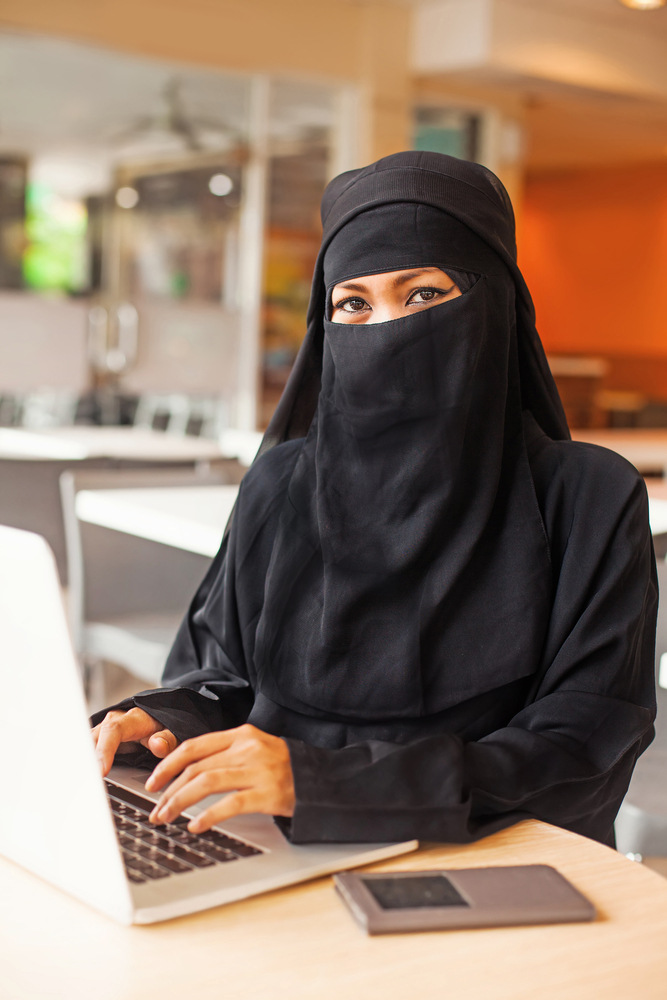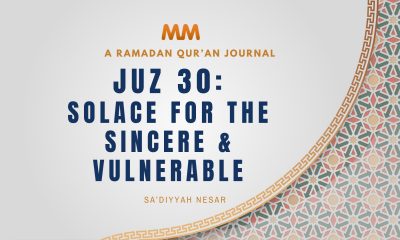#Life
Four Statements Black American Muslim Converts Make That Undermine Their Financial Security
Published

I see many bright young African American Muslims struggle finding their place in the community. Often, our place in a community is determined by how others see our contribution. Our Ummah is not color blind, nor is it class blind. And many of our immigrant brothers and sisters come from societies where class plays perhaps a larger role than ethnicity. So our relative position on the social economic scale factors into the respect that our brethren afford us. So, if we, as a community, are a destitute group, we will have little clout in the discussion on Islam in America. In our brethren’s minds, we are bringing nothing to the table. Many Black American Muslims are struggling economically, unable to finish school or find financial security. The common perception is that most African American Muslims come from impoverished backgrounds or are ex-cons struggling with reintegration in society. But this is not solely the case.
Contrary to popular perception, it is not only White American Muslims who have everything to lose by converting. Many Black American converts who come from Middle Class backgrounds are financially worse off than their parents. Many Muslim American converts, in reality, have made personal, economic, and career choices that have undermined their financial security. There are even second generation Black American Muslims who are worse off than their convert parents. But without an honest look, we may be doomed to repeat the same mistakes.
First, we should understand that several of the people who were promised Paradise were wealthy. There is nothing wrong with wealth, in and of itself. What matters is how we use it. Islam is not the new socialism. And perhaps some people read or misread Ali Shariati. Two, we should understand that secular education is important in our upward mobility. In fact, education is the primary reason why Muslims immigrated to America. So why should indigenous Muslims give up on America’s promise and become ineffectual? Why is it so few Black American Muslims are attending college for professional, advanced degrees, growing businesses, or finding financial security? And importantly, why have so many Black American Muslim initiatives faltered?
Keep supporting MuslimMatters for the sake of Allah
Alhamdulillah, we're at over 850 supporters. Help us get to 900 supporters this month. All it takes is a small gift from a reader like you to keep us going, for just $2 / month.
The Prophet (SAW) has taught us the best of deeds are those that done consistently, even if they are small. Click here to support MuslimMatters with a monthly donation of $2 per month. Set it and collect blessings from Allah (swt) for the khayr you're supporting without thinking about it.
After almost 20 years, some of us are looking back at the choices we made in our personal lives and communities? What led us to make certain choices in our education and professional development? Where did we let others down? Where did we let ourselves down? What resources did we have to achieve important milestones in life? What networks and social ties did we fail to tap into? What sacrifices have we made in becoming Muslim. Did we make any misguided decisions? How can we repair the damage and create a better future for children and ourselves?
I developed a list to begin to explore these questions. This list is not to argue whether something is haram or not, but to discuss the influence of certain religious positions on our lives. What sacrifices are converts making that have a detrimental effect on our financial security? In the next few weeks, I plan on tackling some of these issues. I will show the fatwas that Western Muslims have received from scholars abroad. I will then try to find alternative positions that allow for some flexibility, or endeavors that, at minimum, try to address the challenges we all face in this society.
1. Don’t Deal With non-Muslims (Kuffar), even Your Family and Childhood Friends.
This faulty thinking leads many young Muslims astray and alienates their family. Not only do we fail to listen to our family’s advice, thinking that they don’t have our best interest at heart, but we don’t build stronger ties of interdependence. You are not supposed to break family ties, but maintain them whether or not you share the same religion. How you treat your family and friends can have a huge impact on the so many people’s perception of Islam. But self-isolating ourselves can lead our family and friends to think we joined a Jonestown style al-Qaeda group. Importantly, while there are generous Muslims who are willing to provide a lending hand, your family is bound to sacrifice much more, offer you a place to live, or take care of you if your health falters.
Converts may suffer strained relationships with their immediate and extended family. This can lead to them losing family financial support in school, marriage ceremonies, or business endeavors.
Not only do BAM converts no longer have social networks that they can tap into such as fraternities, lodges, and professional organizations for contacts, but their old college and friendship networks become frayed due to lifestyle choices that our religions demands (i.e. no cocktail receptions or happy hour networking parties and mixers for networking events). Sometimes their classmates just don’t relate.
Second, we fail to form solid alliances with non-Muslims to achieve the greater good. Without a relationship of reciprocity, we find ourselves isolated an alone. Third, we often hire incompetent Muslims and foster paternalism. Some Muslims have an “I only patronize Muslims” policy. Meaning that they hire Muslim contractors who do shoddy jobs or rip them off. Out of aversion to taking your co-religionist to a kaffir court, many Muslims will just eat the loss, as opposed to making these businesses accountable. Also, our fear of backbiting will also keep us from slandering that Muslim who did a poor job or did us dirty by reporting them to the Better Business Bureau.
2. Your Education Will Corrupt You.
Basically, Black AmericanMuslim converts are told that the only real education is sacred knowledge. Time and time again, I have heard tales of bright Muslims not encouraged to finish school, but become students of knowledge. You can end up in a dusty place for a few months or wander aimlessly for a about a year. Unlike some of your Arab and Desi American friends who spend their year abroad, you likely did #1 and your family probably won’t help you out and get back on your feet. Honestly, we do need more scholars of Islam, especially, Muftis (those who can give verdicts) and Fuqaha (slamic jurist) with a strong knowledge of minority fiqh and American society. However, does the community need thousands of young men and women with the equivalent of an elementary degree from a Muslim institution of learning abroad?
The irony is that many converts are discouraged from completing their secular education by foreign scholars and immigrants who are largely educated with college degrees. Immigrant children go to college. They become doctors, engineers, business professionals, executives, and doctors. Most African Americans don’t come from families with enough money to foot college tuition. Nor do many of us get a full on scholarship. The primary way that many African Americans finance their education is by taking a student loan. But look online at the fatwas (rulings), student loans are haram (forbidden).
The immigrant Muslim community in America is largely affluent. So, many have an option of not taking student loans. Very few Muslim organizations offer scholarships to off set education costs. And Muslim lending institutions are primarily geared towards wealthy Muslims purchasing homes, not student loans. So, many Muslims shut the door to education.
The reality is that we need men and women who have the skills and capital to help build our communities. We need skilled labor, infrastructure building, and strategic planning from people who are trained and educated. A higher education can help alleviate some of the greatest challenges our community faces. It will lead to better earnings, which will lead to stable living. Stable living leads to viable marriages, which will help build better neighborhoods. With the rubber stamp of “denial” Black American Muslims are left to flounder, unable to become contributing members of their community and society.
3. Don’t Plan Your Family or Get to Know Your Future Spouse, Because Allah is the Best of Planners
Black American Muslims suffer some of the worst divorce rates. Perhaps we should thank Allah that many of the marriages are religious, and not civil marriages, because if we knew the real statistics, we’d lose our minds. My rough estimate would be that 75% or more of African American marriages end up in divorce. The sad thing is that many of these broken marriages produce children who become scarred in the process.
Many converts have an idealized version of stranger marriages, arranged marriages, and even the marriage match. Depending on if the Muslim comes from a cultish community or not, he or she may be pressured into making an insane marriage choice. I have heard of a college age young woman pressed to marry a recently released ex-con. I have heard of a teenage girl forced to marry middle aged destitute man only to be divorced by the time she’s 17. I have heard of young men pressed to marry women they don’t know and have 3 kids by the time he realizes that his wife is mentally deranged. There are lots of crazy anecdotes. Many American Muslims marry really young, derailing their emotional and financial development. My young students are all proponents for youth marriages; however if they knew the challenges that they would face, they’d think twice.
Converts also come with our own cultural norms, which are contrary to the American Muslim norms of love and relationships, and emotional baggage. Some communities have a sit down. Others may organize marriage meet and greet, or even large conventions. There are online matrimonials, Facebook groups, etc. But more often than not, the process of meeting someone is a nightmare. American Muslims have not yet developed the network to create opportunities for single Muslims getting to know each other.
It is impossible to just throw away our notions of love and marriage. Americans are used to a honeymoon period of dating and getting to know each other. Those wonderful memories of courtship and fun times create, at minimum, some nostalgia about those romantic moments. Even more destructive than our notions of love and romance is the greatest baggage African American converts bring into their Islam. And that is their promiscuity. This stems from our own insecurities, notions of manhood or femininity, and egos tied to sexual conquests. Few of us grew up with two happy, married parents. So, we don’t even know what to look for in a spouse. Many American Muslim marriages suffer from intimacy problems and love doesn’t always develop between the couple.
Muslims are sometimes discouraged form practicing birth control. With a tanking marriage and 7,8, 9, 10 kids, there are some serious financial implications.
4. Don’t Focus on the Dunyah, but the Hereafter.
Many see wealth building or social climbing as a worldly endeavor and they begin to make irrational economic decisions. There are two roots to this version of Black American asceticism: the first, stemming from the Black American protest tradition and the second stemming from abroad. In the protest tradition, middle class values of education and career are White values. Some Black American Muslims transfer the notions of whiteness or “the man” into the unbelievers, “kuffar.” The motivation to reject this world and take on a life of poverty becomes a political choice, tied closely to identity politics. The second root of the Black American aversion towards higher education or professional careers is a foreign import. Some forthcoming studies show how the imposition of these ideas is both unintentional and intentional. Basically, some scholars who have little understanding of the social, economic, and historical condition of Black Americans discourage them from taking the one path to social mobility. These two factors combine to drive many African American Muslims into a faulty notion of asceticism. This form of asceticism, rejecting “worldly education” and “worldly careers,” is often a detriment to many Black American families.
The other problem with this statement is that it channels some of the most talented and charismatic, but maybe not so pious, members of our community into becoming religious professionals. Islam becomes the new hustle. Many of our brightest minds go into careers such as imam, public speaker, religious scholars, or teacher at an Islamic school, when maybe they would have been better as professionals, who donated their wealth and fundraising ability to create community centers and institutions. Instead of giving to the community, they are drawing an income from the community. Further, if we, as a community, discouraged our members from attaining a college degree, then we will have board members with no education, management, or organizational skills. Finally, while non-profit work is honorable, many Muslim non-profits pay a pittance.
This list is not limited to African American converts. I know that other converts, and even children of immigrants, who get caught in this cycle. I hope that by bringing up these points we can begin to address these problems and come up with some solutions. I work full-time in the Muslim community, and I may be rough and gruff sometimes, but I am solution oriented. My goal is to empower us to work for a positive change. Just like everyone else, I am tired of bemoaning the fate of Muslims in America. It is time we do something about it. While I think I have a few good ideas, I know many of you have many more. So, let’s get to work!
Keep supporting MuslimMatters for the sake of Allah
Alhamdulillah, we're at over 850 supporters. Help us get to 900 supporters this month. All it takes is a small gift from a reader like you to keep us going, for just $2 / month.
The Prophet (SAW) has taught us the best of deeds are those that done consistently, even if they are small. Click here to support MuslimMatters with a monthly donation of $2 per month. Set it and collect blessings from Allah (swt) for the khayr you're supporting without thinking about it.
Margari Aziza Hill is co-founder and Programming Director of Muslim Anti-Racism Collaborative (MuslimARC), assistant editor at AltM, co-founder of Muslims Make it Plain, and columnist at MuslimMatters. She is on the Advisory Council of Islam, Social Justice & Interreligious Engagement Program at the Union Theological Seminary and winner of the 2015 MPAC Change Maker Award. She has nearly a decade of teaching experiences at all levels from elementary, secondary, college level, to adult education. She earned her master’s in History of the Middle East and Islamic Africa from Stanford University in 2006. Her research includes colonial surveillance in Northern Nigeria, anti-colonial resistance among West Africans in Sudan during the early 20th century, and race in Muslim communities. She is also a freelance writer with articles published in Time, SISTERS, Islamic Monthly, Al Jazeera English, Virtual Mosque (formerly Suhaibwebb.com), and Spice Digest. She has given talks and lectures in various universities and Muslim communities.


[Podcast] Palestine in Our Hearts: Eid al-Fitr 1445 AH

Foreign Affairs Official Resigns Over Gaza Genocide

A Ramadan Quran Journal: A MuslimMatters Series – [Juz 30] Solace For The Sincere And Vulnerable

IOK Ramadan: The Importance of Spiritual Purification | Keys To The Divine Compass [Ep30]

IOK Ramadan: The Power of Prayer | Keys To The Divine Compass [Ep29]

IOK Ramadan: Choose Wisely | Keys To The Divine Compass [Ep15]

IOK Ramadan: 7 Qualities of Highly Effective Believers | Keys To The Divine Compass [Ep18]

IOK Ramadan: Shake the Trunk of the Tree | Keys To The Divine Compass [Ep16]

IOK Ramadan: Good and Bad are Tests from Allah | Keys To The Divine Compass [Ep17]

IOK Ramadan: Appreciating the Prophet ﷺ | Keys To The Divine Compass [Ep22]

IOK Ramadan: The Importance of Spiritual Purification | Keys To The Divine Compass [Ep30]

IOK Ramadan: The Power of Prayer | Keys To The Divine Compass [Ep29]

IOK Ramadan: The Weight of the Qur’an | Keys To The Divine Compass [Ep28]

IOK Ramadan: Families of Faith | Keys To The Divine Compass [Ep27]

IOK Ramadan: Humility in Front of the Messenger | Keys To The Divine Compass [Ep26]
Trending
-
#Islam2 weeks ago
IOK Ramadan: Choose Wisely | Keys To The Divine Compass [Ep15]
-
#Islam1 week ago
IOK Ramadan: 7 Qualities of Highly Effective Believers | Keys To The Divine Compass [Ep18]
-
#Islam2 weeks ago
IOK Ramadan: Shake the Trunk of the Tree | Keys To The Divine Compass [Ep16]
-
#Islam2 weeks ago
IOK Ramadan: Good and Bad are Tests from Allah | Keys To The Divine Compass [Ep17]





Jamal Bradley
January 19, 2018 at 5:30 AM
Excellent article and this speaks to something which most of us have known for years. These are such dysfunctional issues that by the time some of us know what’s going on, many are already 15-20 years down the line with a ton of baggage. The one thing I’d disagree with is the idea that the immigrant community started out affluent, because in reality, most came to America either very regular and some were poor. However, they avoided the main problems of divorce and forgoing education.
Sadly, the worst part about these issues is that we continue to see new generations of young convert Muslims, falling into the same nonsense. I honestly feel there is a jealousy aspect of older people who simply don’t mind seeing the younger generations fail, for fear they’ll surpass their efforts. May Allah reward you for this article and hopefully it will shed some light on these issues and possibly provide guidance to our people.
Aisha
January 19, 2018 at 11:09 AM
This is an wonderful article! I have seen every scenario you presented numerous times.
Zag
January 20, 2018 at 4:26 AM
Accurate and on point. Even though one may try to guide the next generation, they may not be ready to heed this advice. We must keep talking and trying to redirect them.
Suraiya Mosley-hassan
January 21, 2018 at 8:15 PM
WHAT!!!
This article is quite interesting & far off the mark by the use of “Black American Muslim Converts.” I converted to Islam by ALLAH’s Grace, Mercy & Invitation over 40 years ago under the balanced, wise & progressive leadership of Imam W.D. Mohammed along with thousands of other converts. We were never taught such foolishness & the following generations as my children, grand & great grandchildren those I know & associates with have never even heard these ridiculous non-progressive statements. What I’ve found is these statements are the foundation of ignorance. Those Muslims who have deemed themselves not responsible for self-leadership by being ‘LED’ by some Sheikh, Imam, etc. instead of putting forth the effort to Iqraa, learn, seek knowledge, reflect & live the life ordained for us by ALLAH as “thinking” beings. We were created to EVOLVE not rot in ignorance. We all grow old, it’s a blessing when we learn to grow up by increasing ourselves in USEFUL Knowledge. Please accept my apology if I’ve offended anyone; however, I have been truly offended by the assumption that these are the beliefs of ‘Black American Muslim converts.’ I personally don’t know people from my community that live in that misunderstanding.
Margari Hill
January 21, 2018 at 9:24 PM
Salam alaikum Suraiya,
I’m the author of the blog post.
Deeply sorry to offend. When I made the title, I didn’t intend for people to take this as a generalized statement about ALL Black American Muslims. I’ve been Muslim for 23 years, have worked in convert care, lived in and worked in Muslim communities all over the country and abroad and have seen people really harmed by ideologies not of their own. I’ve also had 1-1s with hundred of people and interviewed numerous people about their experiences as Muslims coming into faith and I wanted to articulate some things I found were harmful for my generation of Muslims who came into Islam but got a little lost along the way. If you read Dr. Sherman Jackson’s Islam and the Blackamerican Muslim, you will read his chapter on cultural imperialism and the toxic effects it has had on Black Muslims. As a Black American Muslim who converted at masjid Warithdeen in Oakland, I am deeply aware of the legacy of that community which was largely insulated from the cultural hegemony of certain movements, from the tablighi jumu’ah, salafi, and neo-sufi movements where people upended their lives with statements like this. You should be grateful that you had the resources that you did and you were able to pass that on to your family. The people we know who believed these statement are often remorseful over the years or their lives are in shambles and families are suffering. Allah knows best.
Farhiya
January 22, 2018 at 9:47 PM
I think your message was spot on! I hope they use the principled of Islam to learn a trade in community college and start businesses. Even Somalis use birth control…you can’t afford to have 5 kids when you renting and live on little money. We learned to limit kids from rental experiences. Landlords refuse to rent to people with too many kids.
Brother Hameed
January 25, 2018 at 5:53 PM
Your article is a good summation of a book I wrote entitled, From the Back of the Bus, to the Back of the Camel: Analyzing the Psychology of Toby Muhammad. In my book, I mentioned the historical origins of this secular and religious dysfunctionality which is actually a trans-generational, plantation based pathology that is a return of post traumatic slavery disorder brought over from Christianity but under a new theology. Through my research, the Black American Muslims whom I call “Toby Muhammad,” who consent to immigrant religious authority figures, are almost never a product of indigenous American Muslim scholarship and are totally averse to the idea of “proper” Islam emanating from a Black American. This comes from hundreds of years of Black Americans being subjected to the system of white supremacy which the “immigrant religious programming” only increases.
Sajid
January 27, 2018 at 2:41 AM
This is the really informative article, we must follow!